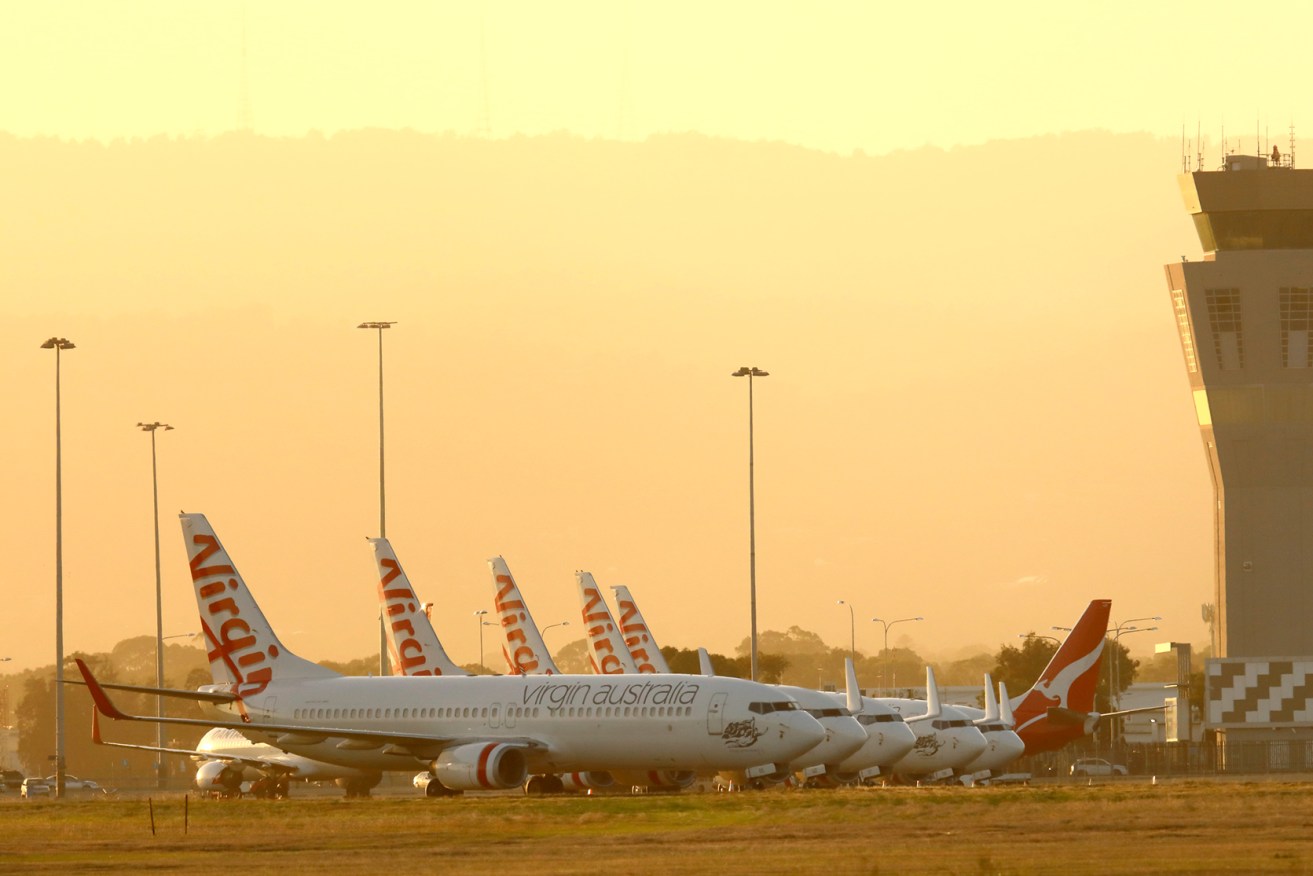Crash landing: Virgin enters administration
Troubled airline Virgin Australia has entered voluntary administration after the debt-laden business was crippled by coronavirus restrictions, with up to 15,000 jobs left up in the air.

Grounded Virgin jets at Adelaide Airport. Photo: Tony Lewis/InDaily
Its board of directors has appointed Vaughan Strawbridge, John Greig, Sal Algeri and Richard Hughes of Deloitte as voluntary administrators of the airline and a number of its subsidiaries.
Virgin’s management team will assist administrators as the airline continues to operate a skeleton flight schedule for essential workers, freight corridors, and returning Australians home.
It will now try to recapitalise the business, to help it emerge “in a stronger position on the other side of the COVID-19 crisis”.
Administrators today said they intend to sell off Virgin Australia within months and don’t plan to carve it up.
“There is an extraordinary number of parties keen to be involved,” Vaughan Strawbridge said.
“This is a matter of months, not longer than that.”
As the hunt for a buyer rolls on, staff who still have jobs will continue to receive their wages, and eligible staff will get the government’s JobKeeper payments.
CEO Paul Scurrah said making the call for administration was tough, but the group to planned to survive the crisis.
“This is a tough day for our airline … (but) we’re certainly not collapsing,” he said.
The Velocity Frequent Flyer arm, while owned by the group, is a separate company and is not in administration.
Velocity In a statement on its website told members their points “aren’t going anywhere” despite freezing redemptions for four weeks.
Members reportedly crashed the Velocity website on Monday night.
They will no doubt be hoping to avoid a repeat of 2001, when an estimated $700 million worth of Ansett Australia global rewards points were rendered worthless when the airline collapsed.
The decision to enter administration comes as Virgin seeks financial assistance from a number of parties, including state and federal governments, to help it through the coronavirus crisis, however it is yet to secure the required support.
A board meeting of international shareholders on Monday night voted against providing more financial support.
Virgin is 90 per cent foreign-owned, with Singapore Airlines, Etihad Airways and Chinese conglomerates HNA Group and Hanshan owning 80 per cent between them, and Richard Branson’s Virgin Group holding 10 per cent.
“They have some very big shareholders with deep pockets,” Treasurer Josh Frydenberg said on Monday.
The meeting came after Virgin went into a trading halt on the stock exchange last week and the federal government rejected its pleas for financial aid.
The carrier is carrying about $5b in debt and last week asked the government for a $1.4 billion loan.
Finance Minister Mathias Cormann on Tuesday said he believed administration can find a sustainable private-sector solution to the company’s future.
“The government is not in the business of owning an airline,” he said.
“It offers the opportunity for private sector interest to come forward and buy the business or assist with the recapitalisation of the business.
“There’s a lot of opportunity from here on in to ensure that there is a viable second airline in Australia moving forward.”
Cormann said those with the first responsibility to step up were its major shareholders.
Opposition Leader Anthony Albanese said not only was the government leaving 15,000 workers in the lurch it was also posing a long term threat to the national economy by putting Australia’s airline system at risk.
“This isn’t a market failure,” he told ABC radio.
“This is as a result of a government decision, the right decision, to shut down sections of the economy to deal with the health crisis.”
Albanese said it was fanciful for the government to believe another airline would emerge on the market if Virgin went belly-up.
Nationals MP David Gillespie said the government made a mistake in refusing to financially help the airline.
“I’m disappointed that we weren’t able to support their request for help,” he said.
“We had two major airlines going into the coronavirus epidemic but it looks like we’ll have just one coming out the other side.”
Most full-time Virgin staff have already been temporarily stood down after the air travel and tourism markets around the country collapsed as the virus spread.
In an open letter to staff globally, Virgin Group founder Richard Branson said Virgin Australia was “fighting” for life.
He said the airline and others in his group need government help in the form of loans to get through “this catastrophic global crisis”.
“We are hopeful that Virgin Australia can emerge stronger than ever, as a more sustainable, financially viable airline,” he told staff.
“If Virgin Australia disappears, Qantas would effectively have a monopoly of the Australian skies. We all know what that would lead to.”
Want to comment?
Send us an email, making it clear which story you’re commenting on and including your full name (required for publication) and phone number (only for verification purposes). Please put “Reader views” in the subject.
We’ll publish the best comments in a regular “Reader Views” post. Your comments can be brief, or we can accept up to 350 words, or thereabouts.




